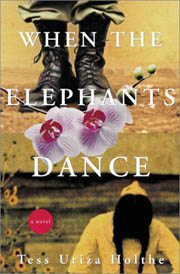Book Sense Author Finds Inspiration in California Bookstore
Accountant Tess Uriza Holthe did not begin the writing class at her favorite bookstore with dreams of completing a novel. At the time, writing was a hobby. However, when Linda Watanabe McFerrin (author of The Hand of Buddha, Coffeehouse Press) -- who was teaching the class "Life into Literature" at Book Passage in Corte Madera, California -- gave her students an assignment to write about a family myth, a treasure chest of memories was unlocked for Holthe. Ultimately, they became the catalyst for her debut novel, When the Elephants Dance (Crown), a Book Sense 76 Pick for January/February 2002.
 "At times I felt like I was not alone in the room, that my lolo and lola (grandparents) were nearby, their spirits urging me on to write about our people," Holthe explains in her introduction to the book. Growing up I longed to find the kind of fictional stories of the Philippines that I was told by my father and lola, but the shelves in the libraries held only travel guides. This book is my humble contribution to the empty shelf that I always longed to fill."
"At times I felt like I was not alone in the room, that my lolo and lola (grandparents) were nearby, their spirits urging me on to write about our people," Holthe explains in her introduction to the book. Growing up I longed to find the kind of fictional stories of the Philippines that I was told by my father and lola, but the shelves in the libraries held only travel guides. This book is my humble contribution to the empty shelf that I always longed to fill."
Storytelling was not only commonplace in Holthe’s family, but also an important part of her Filipino culture. Growing up, her father and lola entertained the family with supernatural tales, interwoven with firsthand accounts of the Japanese invasion of the Philippines during World War II -- where they battled American troops for possession of the Philippines.
"Everyone was under suspicion of being guerrilla soldiers," explained Holthe. "When my father was 13, he was foraging for wood and borrowing food; then he and his neighbors were captured by Japanese soldiers and tortured. The Imperial Army commandeered their homes. Food became scarce. Families huddled in their cellars to avoid suspicion of being guerrillas and to survive the heavy bombings all around them."
Her father’s war stories, and the five myths she developed in her writing assignment became the framework for her novel. Its title was inspired by a quote she found in Robert Lapham’s book, Lapham’s Raiders. "When the elephants dance, it is unsafe for the chickens."
"It felt like a saying they used in the war," said Holthe. "When two supernatural powers were fighting, chickens needed to be careful."
Holthe reinforces that message with her novel’s opening. In it, 13-year-old Alejandro Karangalan is recounting his father’s words. "When the elephants dance the chickens must be careful. The great beasts, as they circle one another, shaking the trees and trumpeting loudly, are the Amerikanos and the Japanese as they fight. And our Philippine Islands? We are the small chickens..."
Using the voices of Alejandro, his older sister, Isabelle, and Domingo, a guerrilla commander, readers experience how, crowded together in their cellar, the Karangalans, their friends, and neighbors tell magical stories based on Filipino myths and legends to pass the time, to encourage each other, and to teach. Their lives on hold, they venture outside only to hunt for food, water, and medicine.
"Five myths were the backbone of my novel," explained Holthe. "One was a myth about the church that sunk in the ground. The folklore is that an angel in the form of a dog came down to test the arrogance of parishioners. Another was about a fisherman who could call fish. I turned it into a young boy searching for his father. When he finds him, he tries to seduce him into his dark powers."
She told BTW, "I wanted to give readers a flavor of the Filipino culture. There was always storytelling, which made for a creative environment growing up."
Another creative environment was at her favorite bookstore, Book Passage. "Elaine Petrocelli, the co-owner, is a wonderful bookseller," said Holthe. "She has three authors in her store, everyday. Independent booksellers are so strong."